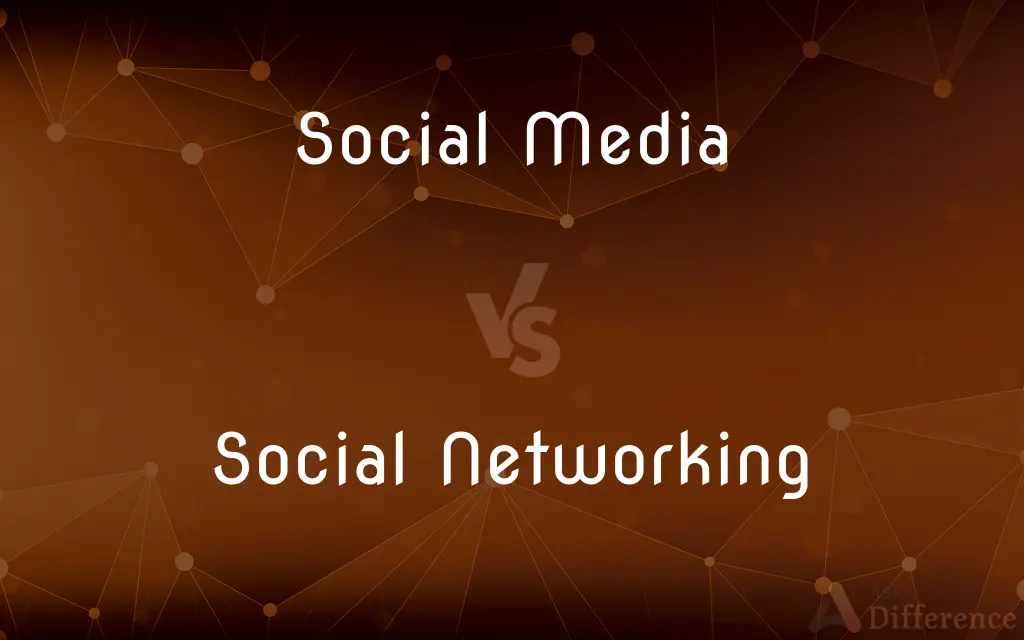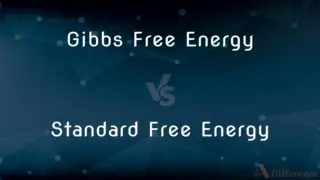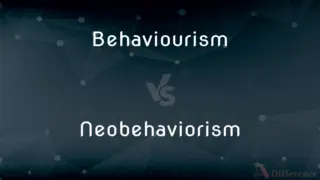Social Media vs. Social Networking — What's the Difference?
By Fiza Rafique & Maham Liaqat — Published on November 19, 2024
Social Media focuses on content sharing and broadcasting to a wide audience, while Social Networking emphasizes building and maintaining personal or professional relationships.

Difference Between Social Media and Social Networking
Table of Contents
ADVERTISEMENT
Key Differences
Social Media platforms are designed for the distribution of content, including news, entertainment, and personal updates, to a broad audience. Users can share various forms of media, such as text, images, and videos, often with the aim of reaching as many people as possible. On the other hand, Social Networking sites primarily focus on establishing and nurturing personal or professional connections. These platforms enable users to connect with others based on shared interests, backgrounds, or professional fields, facilitating more direct and interactive communication.
While Social Media often emphasizes content consumption and viral sharing, Social Networking is more about engagement and interaction among users. Social Media platforms like Instagram and YouTube encourage users to follow accounts and consume a wide range of content, whereas Social Networking sites such as LinkedIn and Facebook are geared towards creating and maintaining relationships through regular interactions, such as messaging and commenting on each other's posts.
Another distinction is in the objectives of the users. Social Media users are typically looking to inform, entertain, or market to a wide audience, using the platform's algorithms to maximize the reach of their content. In contrast, Social Networking users often seek to strengthen existing relationships, meet new people with similar interests, or leverage connections for professional opportunities, prioritizing depth over breadth in their interactions.
The features and tools available on Social Media and Social Networking platforms also differ. Social Media platforms offer features like hashtags, trending content, and analytics tools designed to help users and creators optimize their content's visibility and engagement. Conversely, Social Networking sites provide features that facilitate more personal interaction, such as private messaging, groups based on common interests, and the ability to share updates within a specific network.
Finally, the impact and outcomes of using Social Media vs. Social Networking can vary. Social Media can be powerful for brand building, marketing, and spreading information quickly to a large audience. Social Networking, however, is more effective for building meaningful connections, networking professionally, and engaging in communities with shared interests or goals.
ADVERTISEMENT
Comparison Chart
Primary Focus
Content sharing and broadcasting
Building and maintaining relationships
User Objective
Reach a wide audience, entertain, inform
Strengthen relationships, network professionally
Interaction Style
Broad, one-to-many
Direct, one-to-one or small groups
Key Features
Hashtags, trending content, analytics
Private messaging, groups, connection recommendations
Outcomes
Brand awareness, entertainment, information spread
Professional networking, personal connections
Compare with Definitions
Social Media
Branding and Marketing
Companies use social media for advertising products and connecting with customers.
Social Networking
Resource Sharing
Users share opportunities, advice, and information within their network on social networking sites.
Social Media
Entertainment
Social media is a source of entertainment with various memes, videos, and stories.
Social Networking
Personal Interaction
Social networking enables more private conversations through messaging features.
Social Media
Information Dissemination
Breaking news often spreads quickly through social media platforms.
Social Networking
Platform for Relationships
Users create profiles on social networking sites to connect with friends and colleagues.
Social Media
Audience Engagement
Social media influencers often engage their followers through comments and likes.
Social Networking
Community Building
Social networking groups allow people with similar interests to discuss and share ideas.
Social Media
Platform for Content Sharing
Users can post videos, images, and articles on social media to reach a broad audience.
Social Networking
Professional Networking
Professionals use social networking sites like LinkedIn to find job opportunities.
Common Curiosities
Are there platforms that combine elements of both Social Media and Social Networking?
Yes, platforms like Facebook and LinkedIn incorporate both content sharing and networking features.
Can Social Media platforms be used for Social Networking?
Yes, many Social Media platforms also offer features for Social Networking, allowing users to interact directly and build relationships.
What makes Social Networking effective for professional growth?
The ability to connect with industry professionals, join relevant groups, and access job opportunities.
Why is audience engagement important on Social Media?
Engagement increases visibility and reach of content, making it more likely to be seen by a wider audience.
What is Social Media?
Social Media is a digital platform for sharing content, such as videos, images, and articles, with a wide audience.
What is Social Networking?
Social Networking involves creating personal or professional connections online, focusing on direct interactions and relationship building.
Can Social Networking lead to real-life opportunities?
Yes, many users find job offers, collaborations, and real-life friendships through Social Networking.
How do businesses use Social Media differently from Social Networking?
Businesses use Social Media for marketing and outreach, while they use Social Networking for professional connections and recruitment.
How do Social Media platforms spread information?
Through algorithms that promote content to a wide audience based on engagement and relevance.
How does Social Networking differ from traditional networking?
It allows for connecting with people globally, regardless of geographical barriers, making it more accessible and efficient.
How can individuals use Social Networking for personal benefits?
By connecting with like-minded individuals, receiving support, and accessing information and resources.
How do influencers use Social Media?
Influencers create content to entertain, inform, and engage a large following, often collaborating with brands.
What role do hashtags play on Social Media?
They categorize content, making it discoverable to those interested in specific topics.
Is privacy a concern on Social Networking sites?
Yes, users should manage privacy settings to control who sees their information and interactions.
What is the impact of Social Media on society?
It has a significant impact on communication, information sharing, and the way we perceive news and events.
Share Your Discovery

Previous Comparison
Gibbs Free Energy vs. Standard Free Energy
Next Comparison
Behaviourism vs. NeobehaviorismAuthor Spotlight
Written by
Fiza RafiqueFiza Rafique is a skilled content writer at AskDifference.com, where she meticulously refines and enhances written pieces. Drawing from her vast editorial expertise, Fiza ensures clarity, accuracy, and precision in every article. Passionate about language, she continually seeks to elevate the quality of content for readers worldwide.
Co-written by
Maham Liaqat













































